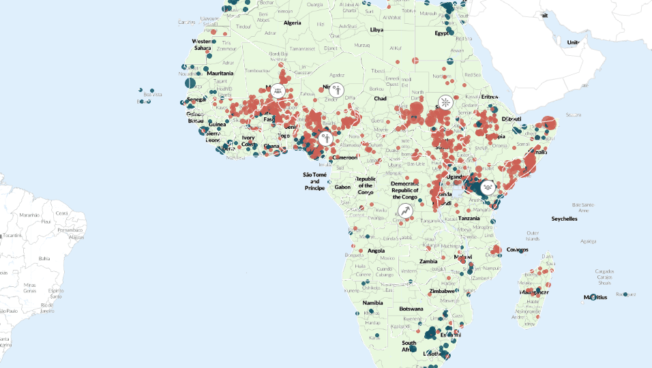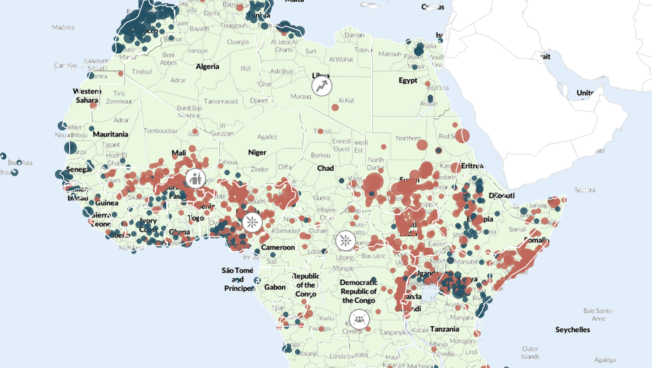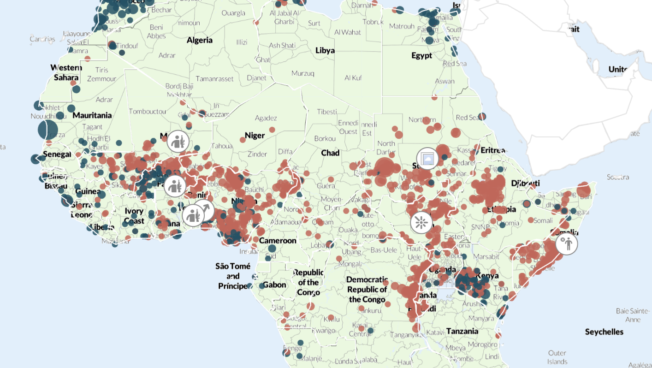Regional Overview
Africa
June 2024
Posted: 5 July 2024
In this Regional Overview
- DRC: Civilian deaths from targeted attacks by the ADF spike in North Kivu
- Burkina Faso: Heavy military losses lead to suspicions of a potential coup
- Kenya: Rising grassroots anti-tax demonstrations against the 2024 Finance Bill
- Nigeria: Violence surges in Niger state
- South Sudan: Deadly violence rises in Nyirol county, Jonglei State
Democratic Republic of the Congo: Civilian deaths from targeted attacks by the ADF spike in North Kivu
In June, attacks on civilians by the Islamic State-affiliated Allied Democratic Forces (ADF) escalated in North Kivu province. The number of reported fatalities resulting from targeted attacks on civilians increased by more than five times compared to the previous month. The violence prompted concern from the African Union, which called on the Congolese authorities and neighboring states to take action against the escalation.1Africa Union, ‘Communiqué du Président de la Commission de l’Union Africaine sur la Situation à l’Est de la République Démocratique du Congo (RDC),’ Africa Union website, 17 June 2024. ACLED records 10 ADF attacks against civilians that each resulted in more than 10 reported fatalities. Several cases involved people being tied up and executed. Two incidents in Beni territory alone accounted for 84 deaths — almost 40% of the more than 220 fatalities perpetrated by the group in June. The military response to this insecurity has forced the ADF to operate in smaller groups,2Caleb Weiss and Ryan O’Farrell, ‘Media Matters: How Operation Shujaa Degraded the Islamic State’s Congolese Propaganda Output,’ Combating Terrorism Center Sentinel, March 2024 but it may also be pushing the ADF southward. Last month, ACLED records the ADF involved in violence in places that indicate the group is expanding southward in North Kivu, likely capitalizing on the military focus on the M23 conflict. Despite the attention on M23, the ADF remains the most deadly armed group for civilians in the DRC.
Burkina Faso: Heavy military losses lead to suspicions of a potential coup
Deadly clashes between the al-Qaeda-affiliated Jama’at Nusrat al-Islam wal-Muslimin (JNIM) and military forces continued in June, with battles involving JNIM leading to over 400 reported fatalities. In the deadliest event, JNIM clashed with military forces in Mansila, Yagha province, on 11 June, resulting in 114 soldiers reportedly killed. This was the deadliest single incident of the month and the deadliest battle since August 2021. In addition, over 250 civilians were reported to have died at the hands of insurgents, army troops, and auxiliary forces, including the Volunteers for the Defense of the Homeland (VDP). JNIM was responsible for nearly 80% of the civilian targeting. June saw the highest number of civilians killed by targeted JNIM attacks in a single month since May 2023. These developments, combined with reports of heavy gunfire near the presidential palace and inside a military base and the state television headquarters in the capital, Ouagadougou,3RFI ‘Burkina Faso: incertitudes après un tir d’obus ce mercredi, les soldats appelés à regagner leur détachement,’ 14 June 2024 have spurred rumors of dissent and a potential mutiny within the military.4Shola Lawal ‘Is Burkina Faso on the cusp of another coup?,’ Al Jazeera, 21 June 2024
Kenya: Rising grassroots anti-tax demonstrations against the 2024 Finance Bill
Violence related to the movement against the 2024 Finance Bill escalated in the second half of June. It culminated on 25 June when demonstrators stormed Parliament minutes after the bill was approved, setting vehicles and parts of the parliament building on fire and clashing with police forces.5Basillioh Rukanga, ‘Thirteen killed and parliament set ablaze in Kenya protests – medics,’ BBC, 25 June 2024 Kenyan police shot and killed more than 10 people and injured over 30 demonstrators.6Evelyne Musambi, ‘Anti-tax protesters storm Kenya’s parliament, drawing police fire as president vows to quash unrest,’ Associated Press, 26 June 2024 On the following day, President William Ruto declared that he would not sign the bill.7France24, “Kenya’s Ruto says finance bill to be withdrawn after anti-tax protest deaths,” 26 June 2024 In June, ACLED records over 150 demonstrations against the 2024 Finance Bill. While most tax-related gatherings remained peaceful, 35% of these events turned violent, with security forces intervening in 7% of the cases. Unlike past anti-tax demonstration movements in Kenya — such as those in 2023 spearheaded by opposition leader Raila Odinga — the 2024 anti-tax demonstrations have not been led by politicians and have drawn support across political divides. Instead, grassroots civil society and youth used social media and online platforms, using the popular hashtags #OccupyParliament and #RejectFinanceBill2024 to mobilize activists.8Basillioh Rukanga and Mercy Juma, ‘Police battle anti-tax demonstrators as Kenya protests spread,’ BBC News, 20 June 2024; Martin Siele, ‘Kenya’s protest movement forces a U-turn on tax hikes,’ Semafor, 18 June 2024 However, the victory of the grassroots movements over the bill did not stop mobilization, as demonstrations continued in the following days and in early July.9Jimmy Mbogoh, ‘Ruto Resignation, MPs’ Pay Cuts: Gen Zs Unveil Fresh Demands As Protests Take New Life,’ Citizen Digital, 28 June 2024
Nigeria: Violence surges in Niger state
Violence in Niger state surged last month, reaching the highest level recorded since May 2022. Over half of the violence took place in Shiroro Local Government Area, where armed bandits and suspected Boko Haram militants carried out over 10 attacks on civilians. In early June, the militants moved from Benin to Shiroro’s Kainja National Park10Dirisu Yakubu, Solomon Odeniyi and Chika Otuchikere, ‘FG orders 50 fighter jets as terrorists occupy Kainji’. Nigeria Punch, 21 June 2024 where, according to local residents, they forcibly recruited and threatened civilians who refused to join militant ranks.11Maimuna R Egigogo, ‘Suspected Boko Haram terrorists kill 20 people in gruesome attacks in Niger State,’ Premium Times, 8 June 2024 Civilians who attempted to return to their villages in search of food were often attacked and killed.12Wole Masodomi, ‘Boko Haram kill 3, raze houses, foodstuffs bank as residents flee in fresh attack on Niger communities’. Vanguard (Nigeria), 12 June 2024 According to Nigerian authorities, Boko Haram seeks to take advantage of the rugged forest terrain of Shiroro, a mountainous area situated along the border with Kaduna state, to stage attacks against security forces and civilians “without fear of being caught,” just like they did in the Sambisa Forest of Borno state.13Africa Defense Forum, ‘Boko Haram Regroups, Inflicts ‘Abject Misery’ In Niger State,’ 5 July 2024 In addition to militant violence, armed bandits and cattle rustlers also raided several farming communities in Shiroro, killing and abducting civilians.
South Sudan: Deadly violence rises in Nyirol county, Jonglei State
In June, clashes between cattle raiders from Greater Pibor administrative area and local armed groups guarding cattle in areas of Nyirol county resulted in a string of fatal violence lasting five days. The sequential battles contributed to the most fatal violence in Nyirol county since February 2020, when armed raiders from the Murle ethnic group carried out several deadly attacks. In addition, last month in Nyirol county gunmen from Baliet county carried out attacks against civilians, described as revenge attacks that followed violence a few days earlier in Baliet.14Radio Tamazuj, ‘One killed, village burned in Nyirol district,’ 13 June 2024 Collectively, these developments led to a spike in violent events in Nyirol county compared to last month and made up for more than nearly 60% of the total political violence throughout Jonglei state in June.
See More
See the Codebook and the User Guide for an overview of ACLED’s core methodology. For additional documentation, check the Knowledge Base. Region-specific methodology briefs can be accessed below.
Links:
For additional resources and in-depth updates on the latest political violence and protest trends, check our local observatories for Mozambique and Ethiopia, as well as our special Nigeria Election Violence Tracker project.







